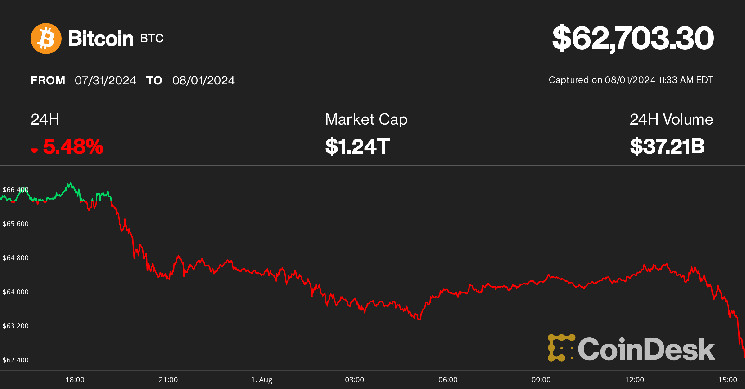Bitcoin (BTC) continued its sharp pullback after a fast start to the week, with the price retreating to a two-week low of of $62,700.
At press time, bitcoin was lower by 5.5% over the past 24 hours, outperforming the broader CoinDesk 20 Index's 6.1% decline. Ether (ETH) was off 5.8%, Solana (SOL) 10% and XRP (XRP) 10%. It was roughly 72 hours ago when bitcoin touched more than a four-month high just above $70K.
Markets received what nominally was good news on Thursday morning, with the U.S. July ISM Manufacturing PMI falling far more than economist expectations, sending interest rates to multi-month lows across the board. Also, U.S. initial jobless claims jumped to their highest level in about one year. Taken together, the data adds to ideas that the U.S. in on the cusp of a monetary easing cycle by the Federal Reserve – usually thought of as bullish for risk assets, bitcoin among them.
Speaking yesterday following the Fed's policy meeting, Chairman Jerome Powell indicated that a rate cut for September is very much on the table should the data continue to show slowing economic growth and inflation.
In other news, the Bank of England Thursday joined the monetary easing campaign begun earlier in 2024 by the Bank of Canada and European Central Bank as it trimmed its benchmark lending rate for the first time in four years.
Bitcoin bulls mull Trump's sliding victory chances
Looking at the bigger picture, bitcoin's pump to $70,000 on Monday followed the excitement of the Bitcoin 2024 conference in Nashville and the pledge of GOP nominee Donald Trump to be supportive of all things Bitcoin and even consider having the government hold the crypto as a strategic asset.
That's all well and good, but bitcoin bulls now need to consider that Trump's victory chances are not what they were two weeks ago when his foe was to be Joe Biden. New Democratic nominee-apparent Kamala Harris' odds of winning the election have steadily risen throughout the week to the current 44%, according to Polymarket. Trump's victory chances have faded to 55% versus 70% just two weeks ago.
Whether a Harris administration would fight Bitcoin and crypto with the same ferocity as that of the Biden administration remains to be seen, but the odds of an industry-friendly new president in 2025 have gone down.
 coindesk.com
coindesk.com
